On Elul 17, 5699 (September 1, 1939), the Germans invaded Poland, thus starting the Second World War. After about a month, Poland ceased to exist as a country, and its territory was divided between Germany and the Soviet Union, according to the Molotov-Ribbentrop Pact signed a week before the outbreak of war. Following the invasion of Poland, Great Britain and France declared war on Germany, but only after about six months did they actually move forces. In the spring of 1940, the Germans began a war on the Western Front, and in less than three months conquered most of Weste [Read more]
On Elul 17, 5699 (September 1, 1939), the Germans invaded Poland, thus starting the Second World War. After about a month, Poland ceased to exist as a country, and its territory was divided between Germany and the Soviet Union, according to the Molotov-Ribbentrop Pact signed a week before the outbreak of war. Following the invasion of Poland, Great Britain and France declared war on Germany, but only after about six months did they actually move forces. In the spring of 1940, the Germans began a war on the Western Front, and in less than three months conquered most of Western Europe: Denmark, Norway, the Netherlands, Luxembourg, Belgium and France. In the meantime, the following countries joined Germany: Italy, Bulgaria, Hungary, and Romania, in a bloc known as the Axis countries. About a year later, the Axis countries occupied Yugoslavia and Greece.
The Situation for the Jews
In Poland, the antisemitic legislation began with the German occupation. In the first months, it was characterized by actions such as: physical abuse, kidnapping for slave labour, restrictions on Jewish businesses, wearing a mark to identify them as Jews, as well as banning gatherings (including praying in public) and traveling on public transportation. After this, the bank accounts of the Jews were blocked, which greatly worsened their financial situation. At the same time, a slow process of ghettoization began in Poland – the concentration of Jews in limited areas intended for Jews only. The first was established in Piotrkow already in Tishrei 5700 (October 1939). In Nissan 5700 (May 1940), the Lodz ghetto was closed, and it was the second largest ghetto with more than two hundred thousand inhabitants. About half a year later, the ghetto in Warsaw was closed, where more than half a million Jews lived. The process accelerated only in 1941, when dozens of ghettos were established, among them in Krakow and Lublin. Some of the ghettos were closed, such as the Lodz Ghetto which was completely cut off from the non-Jewish world, and the Warsaw ghetto which was surrounded by a high wall and which Jews were forbidden to leave without special permission. Some ghettos were open to different levels of contact with the outside world. Usually, the ghettos were established in the densest and neglected neighborhoods of the cities. In many cases, overcrowding prevailed, and there was a severe lack of basic necessities and proper sanitary conditions. In Western Europe, no ghettos were established, but other measures were taken against the Jews, such as: marking Jewish clothing with a yellow patch, a full curfew during the hours of darkness, a ban on riding bicycles, a ban on entering public places, and financial restrictions. Earlier, following Heydrich order in Elul 5699 (September 1939), the Germans established Jewish Councils (Judenrat), which were intended for the difficult task of conveying the German rules to the Jewish public and leading the Jewish communities with the meager means at their disposal. In the large ghettos, the Jewish councils had Jewish polices to maintain order.
The Reaction of the Jews
Due to German terror, about 300,000 Polish Jews fled to the east across the Bug River, already in the first weeks of the war. The Soviets then closed their border, and crossing became almost impossible. Emigration to other countries was also extremely difficult due to the countries of the free world closing their gates to Jews. The Jews tried to cope with their new and difficult reality. Jewish aid organizations, led by the Joint, sent financial aid to Jews in the Nazi occupied countries. Through these funds and it funds collected by the Judenrats, public kitchens were established for the hungry, Jewish hospitals were opened, and the activities of some relief organizations were renewed. German labor factories were established in the large ghettos, but they did not provide enough jobs as the enormous number of unemployed. The number of Jews who received a permit to work outside the ghettos was also small. In some places, smuggling food into the ghetto was a necessary condition for the survival of the ghetto residents, and it was done at great personal risk, even by ten-year-old children. The struggle to survive went beyond everyday physical existence. In the places where this was possible, the various educational institutions were re-opened, and in the places where it was forbidden to open schools, there were underground classrooms. Ideological educational activity also took place within the framework of the various youth movements that operated in the Jewish communities. Despite the difficulty and dangers, the observance of the mitzvot continued, not only in private life but also in public life. In particular, this was manifested through public prayers and sermons, which continued to be conducted either openly or secretly. In several places there were even activities documenting Jewish life in their new situation, either by the initiative of the Judenrat, such as in Lodz, or by an underground initiative, such as the “Oneg Shabbat” archive, founded by Dr. Emanuel Ringelblum in Warsaw.
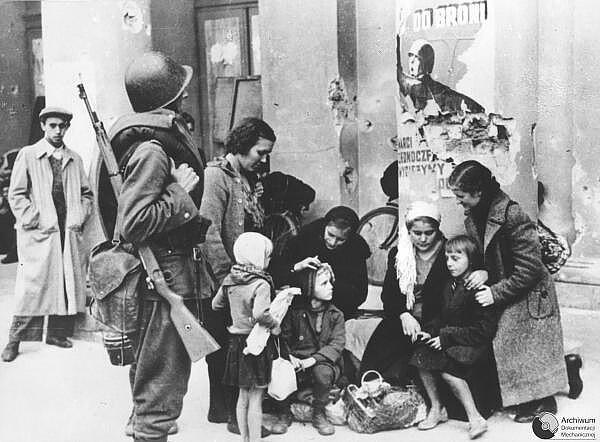
Women and children in Warsaw, Poland, after the Gestapo entered the city
And Then - Everything Changed
And Then - Everything Changed
On Friday Elul 17, 5699 (Sept. 1, 1939), the Germans invaded Poland. We were gripped with shock, but no one imagined how this invasion would affect the fate of the world, in general, and the fate of the Jewish People, in particular.
On Shabbat, Elul 18 (Sept. 2), the day after the German invasion from Poland, we were told that German soldiers were on the way to our home. Great fear reigned in the house. My father had a very special factory. The purpose of the factory was to produce cotton wool and different fabrics from diverse raw materials. My father kept the raw materials in many warehouses he had around the city. In addition, my father was the chairman of the merchants' organization in the city of Lodz and was very well known amongst the Jewish, Polish, and German merchants, as well. These two things caused the Germans to come to my father already on the second day of the war, and indeed, on the same Saturday, three senior German soldiers from the Nazi stormtroopers came to our house with a letter from Berlin addressed to my father. The Germans were very organized and knew about all my father's property and all the raw materials that were stored in the various warehouses. The letter said that we should close all the warehouses and hand them over to the Germans in exchange for German marks. Even though my father thought that the German money was worth nothing and that in two to three months when the war was over, the money would have no value at all, he preferred to give them the warehouses and said in the words of Abraham our forefather: "Give me my soul, and the property, take for yourself" (Genesis 14:21). From that day on, my father's warehouses and their contents, belonged to the German government and we were not given permission to use them, only to transfer the goods to the German warehouses as needed.
Life in the shadow of the war began to be difficult. Ther Germans walked on the streets and grabbed Jews for slave labour. When I was walking in the streets of Lodz, a German solider suddenly jumped at me, wrapped me in his arms, and placed me on a truck with dozens of other Jews. I was shocked, "Is this how people are kidnapped?" I wondered to myself. What could it be? I was not ready for such humiliation and in a small moment of inattention on the part of the German soldier, I jumped from the truck while it was moving.
After some time, a rumour arose that what happened to me was not a kidnapping for the purposes of occasional slave labour for the Nazis and their collaborators. Rather, it was an experiment by the Germans to poison Jews in trucks. The truck was taken to the extermination camp "Chelmno" where the experiment was carried out and all the Jews in the truck were murdered. Due to the miracle that was done to me, I brought in ten Jews and said the blessing for being saved "He Who bestows kindness upon the culpable, for He has bestowed goodness on me."
(The Last Chassid - Yisrael Yitzchak Kihen - Lodz)
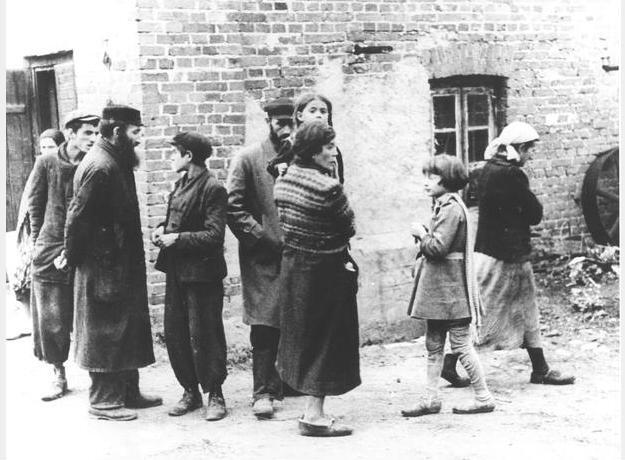
Worried Jews standing at a street corner in a Polish town at the start of the war
Yoel Schiff – The Burden of Heaven (Rudnik, Galicia)

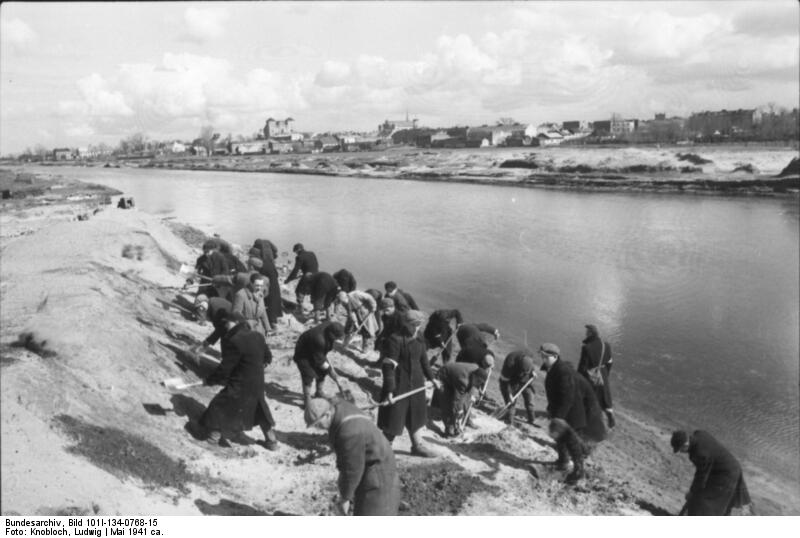
Jews working as forced labourers on the bank of the Wisla River in Warsaw, Poland
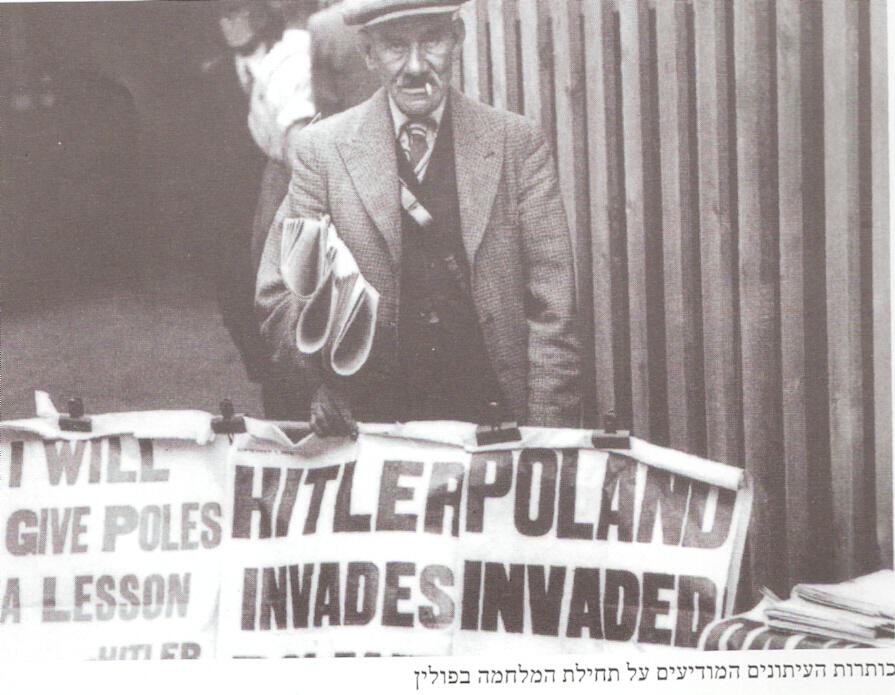
Newspaper headline announcing the beginning of the war in Poland
Sarah Tzohar – The Outbreak of War and the First Decrees (Krakow, Poland)

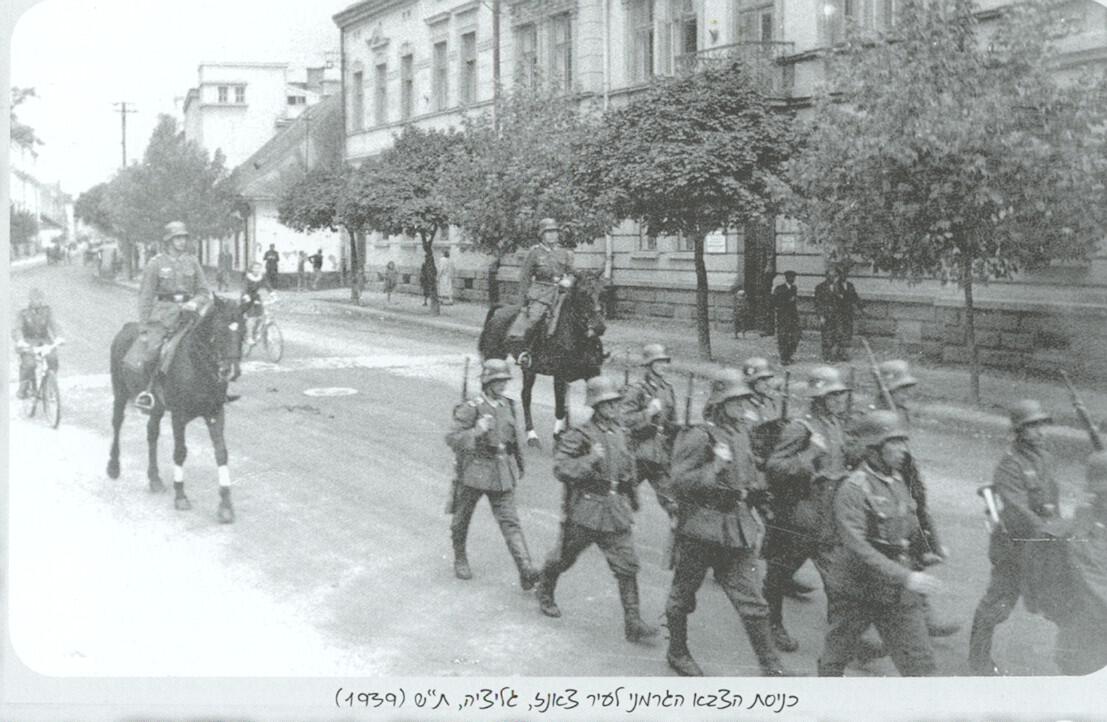
The Germany Army entering the city of Sanz in Galicia, Poland
Ephraim Manela – The First Decrees (Sosnowiec, Poland)

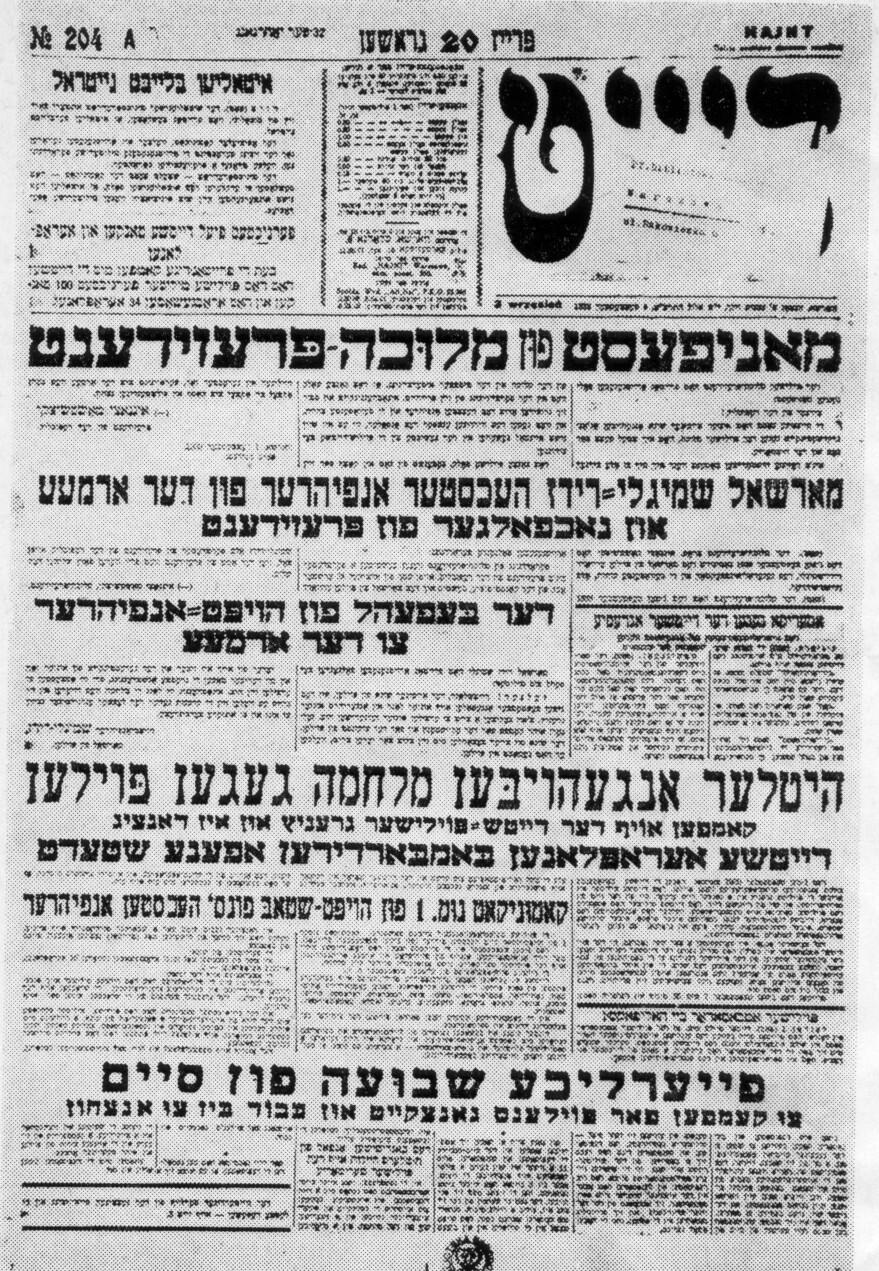
The cover of the Heint (Today) newspaper announcing the German invasion of Poland
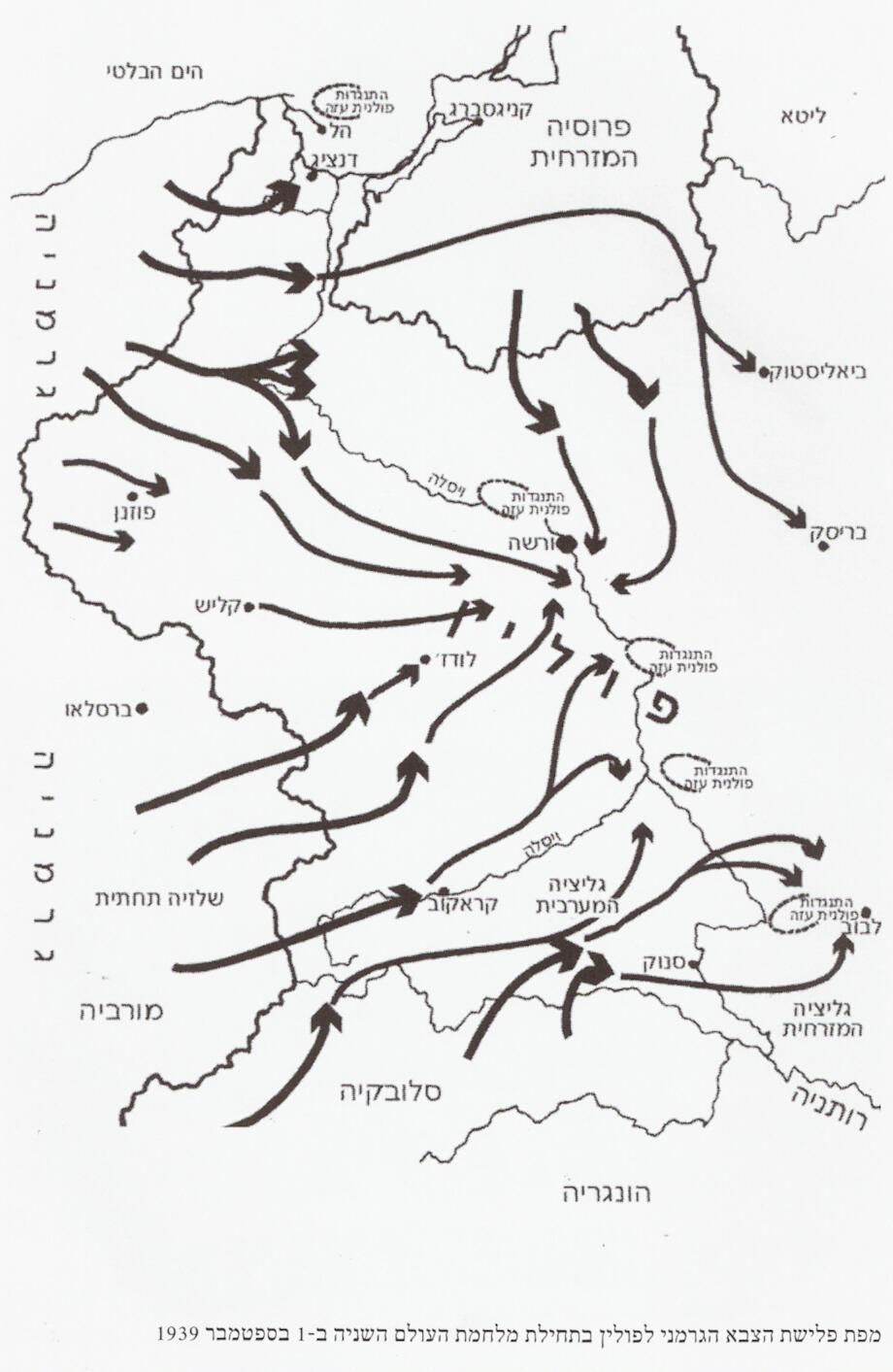
A map of the German conquest of Poland at the start of the war
The Nazis Invade Poland
The Nazis Invade Poland
On Friday Sept. 1, 1939, Elul 17, 5600, at six in the morning we heard a siren in the city. At the beginning, the residents did not know if it was an experiment and a false alarm, or a true siren and the outbreak of war. It was the end of the long break, and a large part of the children had not yet returned from vacations. That day we were going to start school. Everything was cut off. Life stopped. War...
German planes flew over the city en masse. The ignorance of the residents was so great. Some even thought that the Polish army had launched its squadron of planes into the air. And the planes we saw were our planes - Polish military planes.
Millions of refugees tried to escape to the east from Western Poland, and during the first week of the war, milions of refugees came through our city. Among the refugees there were of course Jews, but also Poles who were against the Nazis fled to the east, fearing for their lives. People escaped in any way possible. The busses and wagons were full of scared refugees, and there were some who had no choice but to make the long way on foot. The direction of travel was towards the cities of Eastern Poland, far from the battlefield and close to Russia. From there, the refugees hoped, they would be able to cross the border and escape to Russia. Tarnow stood at the head of the road, and most of the refugees passed through it on their way to the east.
In the middle of Shabbat, several buses filled with religious Jews drove down the main street. We realized that now we are in a true life and death situation.
I looked at the refugees fleeing for their lives, and I didn't know whether to pity them or if they were in a better situation than me. After all, they were running away to the east and I was being left behind. Before my eyes were scenes that in other situations might have made us smile, but not so in such a tragic situation. One day I saw two young refugees leading a baby carriage towards the east. To my astonishment, I discovered that there was no baby inside the stroller. Their grandmother was sitting there…
From the news we read in the newspapers, we understood that the situation was not good, and the Germans were making huge strides in our direction as well. Some of Tarnow's residents also tried to save their lives and left the city, but most of the Jews remained in the city, including our family.
(A Mother's Prayer - Natan Ginzberg - Tarnow)
Yitzchak Rosmarin – Escape to Warsaw (Krasnolsiec, Poland)

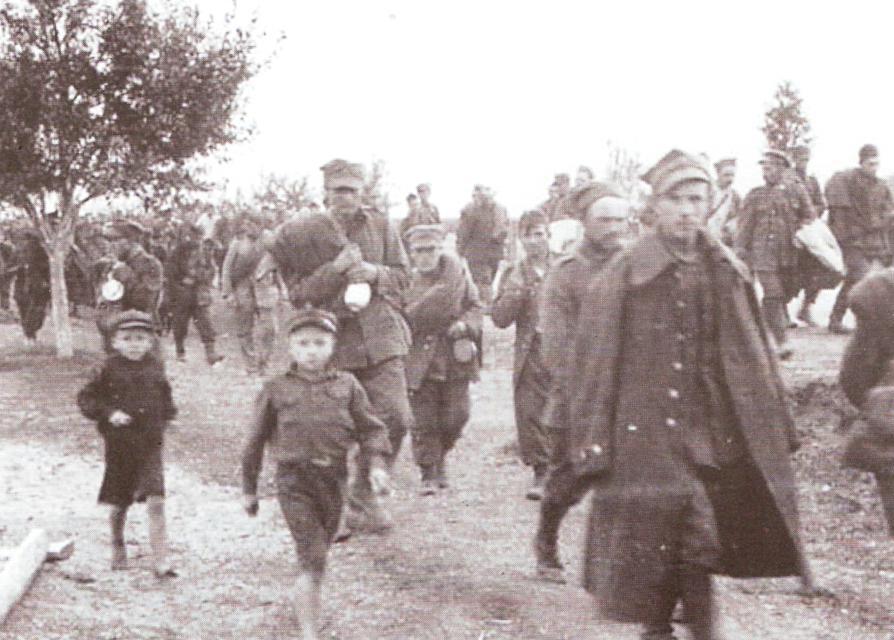
Residents of Porschnitz fleeing their home at the beginning of the war
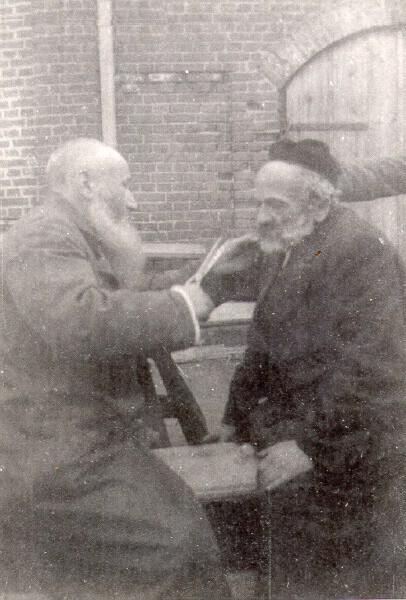
An elderly chassid is forced by the Germans to shave the beard of his friend
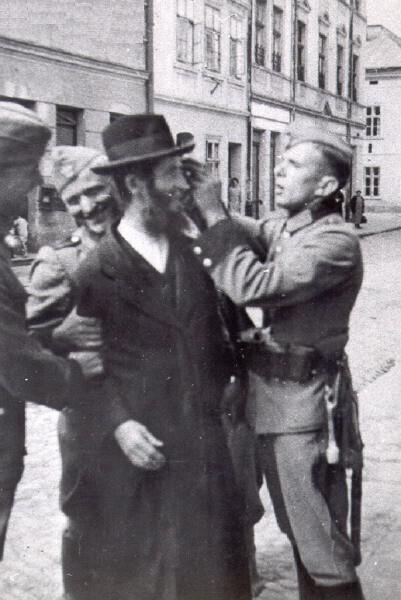
German soldiers shaving the beard of a Jew in Poland
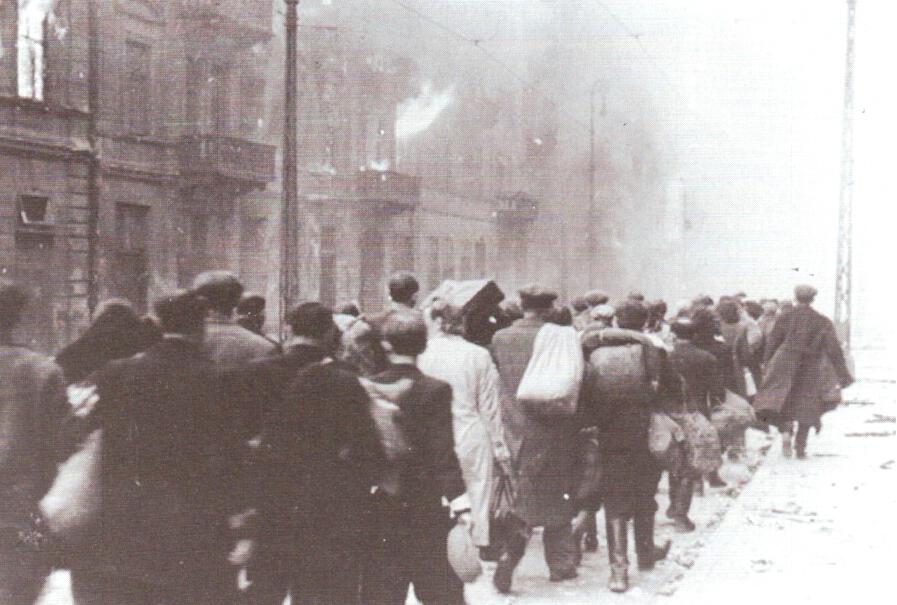
Jews fleeing with their belongings from Warsaw under bombardment
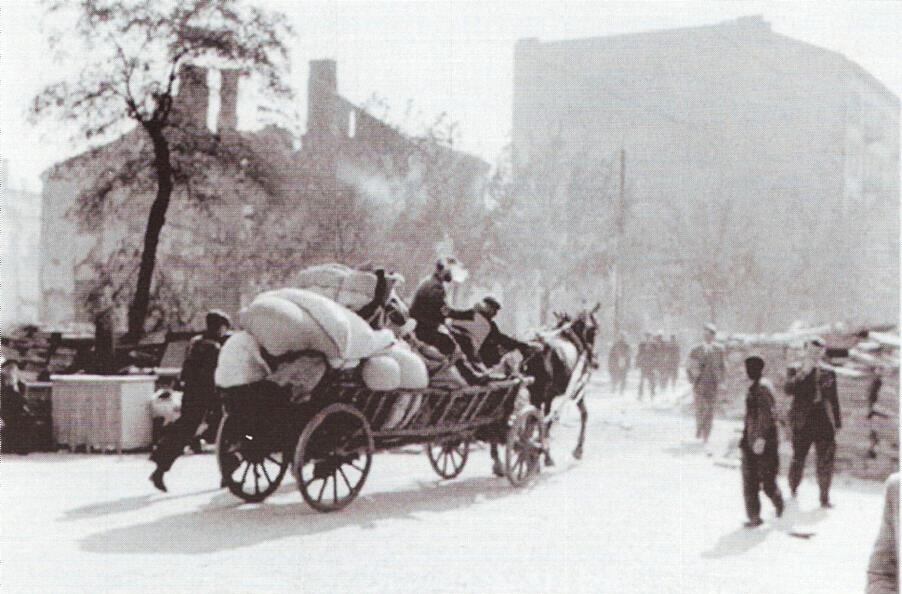
Jews fleeing with their belongings from Warsaw under bombardment
Zimmel Rotstein – The Invasion of Poland (Poland)

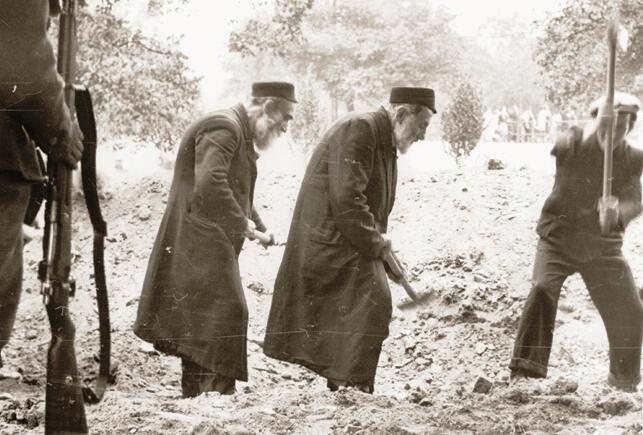
Elderly Jews working in forced labour, under the watch of Polish soldiers
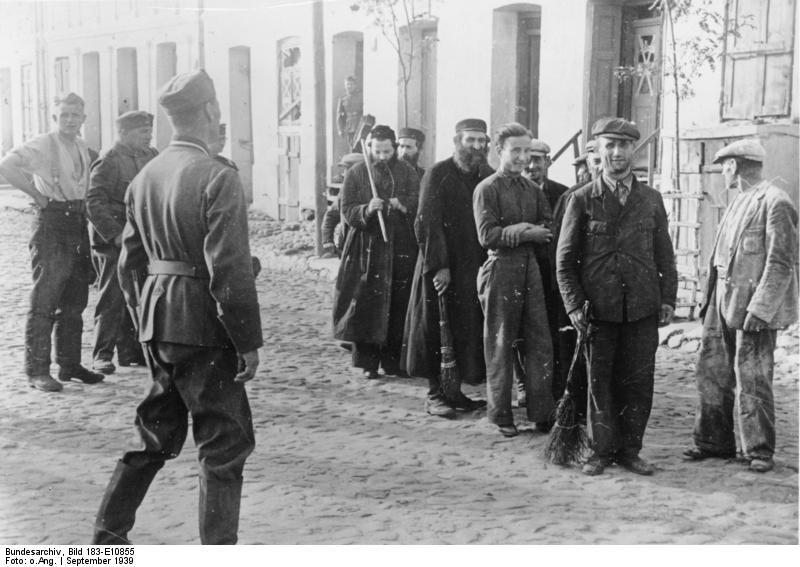
Chassidic Jews in Warsaw mobilized for forced labour upon the German invasion of Poland
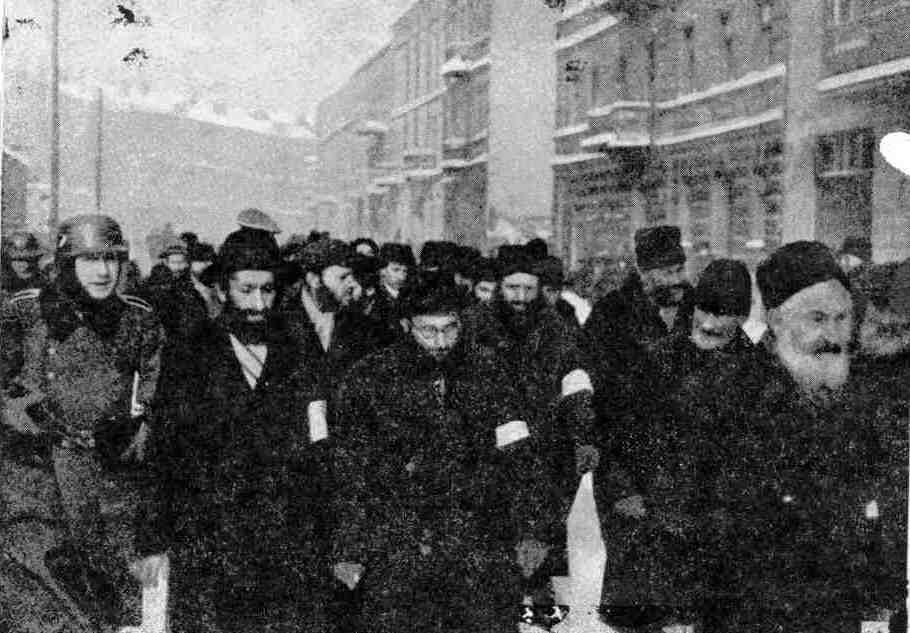
Chassidic Jews from the city of Bedzin being taking taken for forced labour
Dov Silber – Hospitality with the Outbreak of the War (Piotrkow, Poland)

Asher Mandelbaum – The First Decrees (Krakow, Poland)

Winds of War
Winds of War
Friday morning, Sept. 1, 1939, Elul 17.
Loud noises shake the sky. German planes pass overhead and drop bombs. The city goes up in smoke and fire. First the churches, followed by the industrial area, the train, and then more and more… We sit at home, huddled together. Every now and then the house shakes from another bomb.
"We will go," said my father, "we will pack our belongings and we will go."
My mother looks at her children sitting next to her. Some of them are still very small. Liba, the youngest, sits on her lap and Chaim holds on to my mother's dress. Another book strikes the swaying building. "To where"? Her eyes ask my father, wondering, frightened.
To Lodz. My father and mother decide to go to Lodz. Each one of us quickly grabs several important positions. A tense silence prevails in the house. In a short time we are organized. Each of us has a small package with a few things in it. Even the little ones among us have to carry something. My eyes pass over the wall of the house. Tension.
The items remain in their places. Chairs, the table, the large picture on the wall. Will we return to here? When?
Lodz is not far, around 45 minutes train ride. We walk towards the train station but wait… very quickly we realize that we are making our way in vain. The tracks have been bombed, the people we meet on the way tell us; the train cannot go on its way.
We lift our packages again and continue to walk. My mother, father, and seven children. On the streets, people are hurrying to various places. Bussinesses are closed. The smell of smoke and destruction. The city of today does not resemble the city of yesterday. Piece and quiet have left her and gone onwards.
(The Felled Forest will Rejoice, Menachem Brickman - Pabianice)
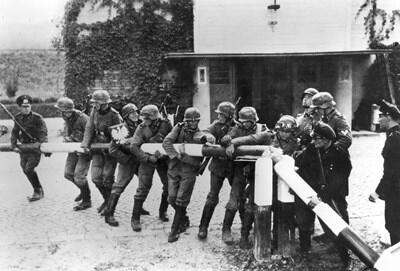
German soldiers remove the border barrier between Poland and Germany, 1939
Menachem Mendel Brickman – Forced Labour on Yom Kippur (Pabianice, Poland)

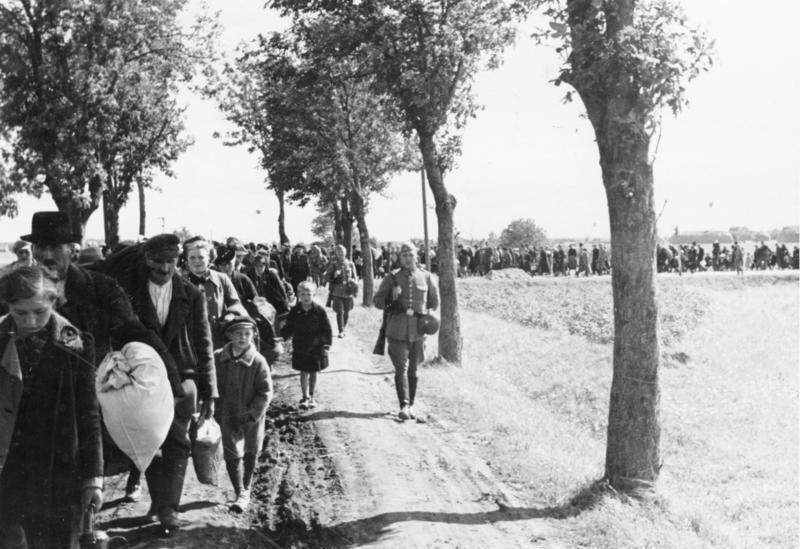
Jews deported from their city upon the German conquest of Poland
A Torah Scroll is Not Abandoned!
A Torah Scroll is Not Abandoned!
In those days of terrible horrors - the end of 1939 - my two sisters, Hania and Livcha, visited me in Kalisz… They came on foot, disguised as gentile women, a distance of 80 km, to see me. During the two days they stayed in Kalisz, they told me about what happened to our parents and themselves since the war broke out. Even before the war began, the Polish army confiscated all the horses that were on the estate. Only one lame horse was left. On Friday September 1st, when the war broke out, there was no point in staying at the estate. Everyone fled, including all the surrounding gentiles. Father took the limping horse and harnessed it to a wagon, on which they loaded some clothing and belongings. And everyone - my parents, sisters, and young brothers went on their way. They didn't have time to reach far, as they they ran into a Polish military guard who confiscated the limping horse. In their panicked escape, my parents had no choice but to abandon the wagon and the few possessions they had tried to save. But there was one precious object on the wagon, which father was not ready to abandon. It was a Torah scroll! Father was a weak man, and had never experienced carrying a heavy load. And yet, father took the heavy Torah in his arms. And he carried it in the scorching heat that prevailed that day for a distance of about 45 kilometres until they reached the town of Zolochiv. There, they put the Torah scroll into synagogue's holy ark. In doing so, my father set a personal example for his children, saying: "A Torah scroll is not abandoned. One must show devotion to the Torah."
(Like a Lone Tree in the Desert, Yehoshua Eibeshitz - Kalisz)
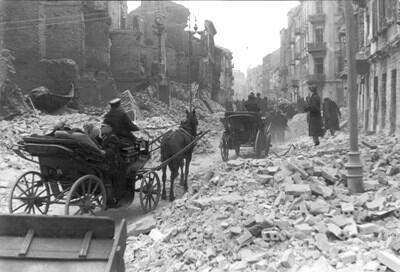
Jews travelling in buggies amongst the ruins after the German conquest of Warsaw, Poland
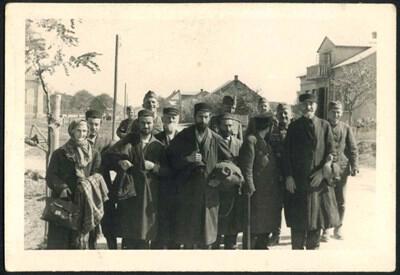
German soldiers take a picture with Jews in Lublin in 5669 (1939)
Yaakov Leibowitz – The City Burns: The Outbreak of War in Rymanow (Poland – Siberia, Russia)

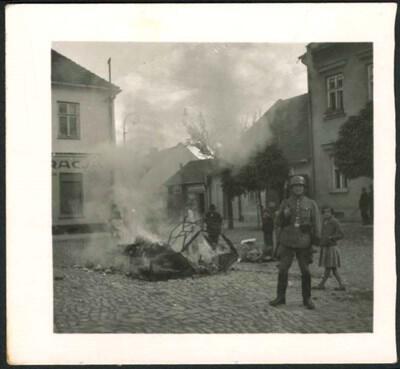
German policemen burning Jewish property in Lublin, Poland
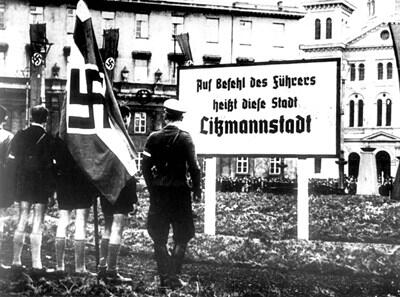
A sign placed in Lodz, Poland stating the new German name of the city
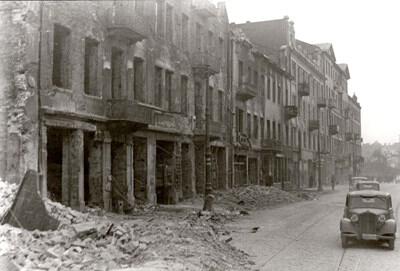
Destroyed buildings in Warsaw after the conquering of the city, 1939
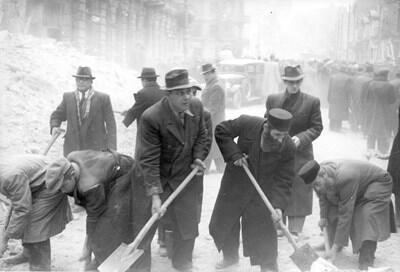
Jews removing debris in October 1939 after the conquest of Warsaw














































